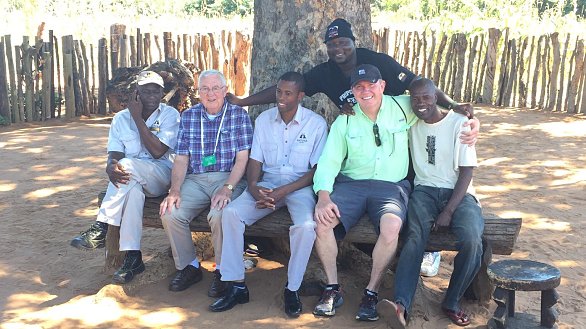An unexpected blessing
By Bishop James E. Swanson Sr.
We were in Zimbabwe to attend the 25th Anniversary of Africa University, but we took an extended side trip and one day we found ourselves in a local village.
We sat under a tree in Zimbabwe and we talked about life. Three men from Mississippi, one man from Nigeria, and three men from Zimbabwe, including the man who invited us to his house.
Oh, did we talk.
The conversation was mostly just about how to survive in this changing world.
One topic was marriage. We discovered that in Zimbabwe polygamy is still practiced in principle. But that it is only feasible if one can afford more than one wife. It was practiced in the past because the number of children provided laborers for the household but, our host explained to us that today it the practice is less prevalent because of the economy and the demands of educating children.
We were thoroughly impressed with our host's and his family's understanding of the interrelatedness of life.
He said, “We live because we are in harmony with all that is around us. We've learned from the non-governmental organizations how to rotate our crops; we rest part of our land so it can replenish itself.”
Sounds biblical, doesn't it my friends.
He also told us how he exists with animals.
“We have dogs that alert us when the elephants, impalas, cape buffaloes and others come to eat our crops. We then we get up, beat the drums and make loud noises to scare them away. And then sometimes the cats and the hyenas come looking for our chickens and cattle. They come at night, so we start fires and beat the drums to drive them away, as well. But, we never kill any of the animals. Even the wasps build their nest inside our round houses and the empty nests later become a source of medicine. Everything is used, recycled and has some great purpose.”
He explained that the 300 families in the village often they get what they need through a “barter system” with their neighbors.
Our host inherited his land and three round houses from his parents; he has since added two round houses. His yard and round houses are clean. And the clothes hanging on a clothesline are cleaned by soap made from charcoal.
So what did we learn from our host and the conversation?
- We have more in common than our surroundings might lead one to believe.
- The world was created “for” us and not “against” us.
- Despite our reputation that “men don't like to talk,” we talked a lot.
- We all love our wives, have hopes and dreams for our children, and require little to meet our simple needs.
And we discovered, when it came time to part company, we had become friends for life.
Bishop James E. Swanson Sr. president
General Commission on UM Men
bishop@mississippi-umc.org


